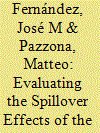| Srl | Item |
| 1 |
ID:
173211


|
|
|
|
|
| Summary/Abstract |
A bargaining framework and a measure of conflict polarization are developed from two elements: (i) hatred-based negative externalities experienced by the parties to the conflict, and (ii) penalties the parties impose on their delegated negotiators when concessions are made in the bargaining process. The framework establishes agreement and disagreement regions and it is shown that a necessary condition for a negotiated solution is the adoption of a dual policy that combines dissociative political and military strategies. This analytical approach is applied first to polarized conflicts generally and then to the specific case of the internal conflict in Colombia between that country’s government and the FARC guerrilla group. The model provides a rationale for the complex dynamic of Colombia’s current peace process, which has involved a preliminary agreement and its subsequent rejection in a national referendum. Our analysis highlights the successful dissociative political-military strategy followed by the negotiators that enabled them to reach the agreement and the negotiators’ underestimation of the hatred levels that led the majority of the Colombian society represented in the referendum to vote the agreement down because they considered the concessions made by the government too generous to be acceptable.
|
|
|
|
|
|
|
|
|
|
|
|
|
|
|
|
| 2 |
ID:
107889


|
|
|
|
|
| Publication |
2011.
|
| Summary/Abstract |
This article applies David Galula's theory of counterinsurgency to help explain the failures and successes in Colombia's counterinsurgency efforts against las Fuerzas Armadas Revolucionarias de Colombia, or the Revolutionary Armed Forces of Colombia (FARC). The case study demonstrates the continuing utility of Galula's ideas which, in their parsimony, highlight most of the important causal factors that account for dissimilar outcomes in the Colombian conflict. Colombia's divergent responses to the FARC throughout the history of the insurgency demonstrate both the detriment of improper strategy and the progress that can be achieved when Galula's laws are utilized.
|
|
|
|
|
|
|
|
|
|
|
|
|
|
|
|
| 3 |
ID:
165351


|
|
|
|
|
| Summary/Abstract |
The Colombian civil war lasted for nearly six decades with approximately 10 percent of its population being displaced over the same period. The implications of this conflict have transgressed international boundaries. Countries such as Ecuador experienced an exodus of victims as well as an increase in the presence of armed groups, along with the proliferation of illegal businesses. Even though the internal social and economic consequences of the Colombian conflict have been documented in the literature, there is yet to be a study addressing these issues from the perspective of impacted neighboring countries. In this work, we contribute to the literature by evaluating whether the influx of asylum seekers and the increasing presence of armed groups in the bordering provinces of Ecuador have lead to an increase in violence among these provinces. We do not find any link between the arrival of asylum seekers and the incidence of violent crimes in the Ecuadorean bordering provinces. Similarly, our results indicate that despite an increase in the presence of armed groups, these regions did not experience an increase in the homicide rates significantly different from the other provinces. The results are robust to various specifications and econometric techniques.
|
|
|
|
|
|
|
|
|
|
|
|
|
|
|
|